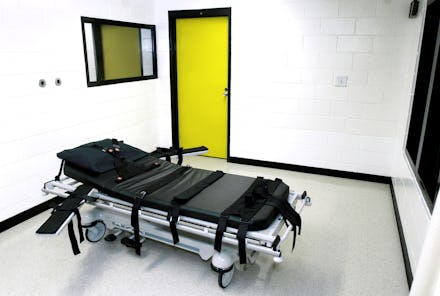A Death Row Inmate Is Taking a Bold Step to Raise the Curtain on Lethal Injection

The news: While controversial death penalty cases often make the headlines, most of the American public never actually see an execution in action. It's an abstract argument, dealing with ethics, laws and cost-benefit analysis, but the visceral reality of the loss of human life is something we don't usually grapple with.
One man is trying to change that. Russell Bucklew, a death row inmate in Kansas City, Mo., has filed a motion to have his execution videotaped. The 45-year-old, who was put away 18 years ago for the rape of his ex-girlfriend and the murder of her new partner, argues that his execution is unconstitutional. He and his legal team believe that if he survives his lethal injection, the tape could serve as proof of injury; if he dies a painful death, it could be evidence for a claim by his estate.
"If Missouri officials are confident enough to execute Russell Bucklew, they should be confident enough to videotape it," Cheryl A. Pilate, one of Mr. Bucklew's attorneys, said in a statement. "It is time to raise the curtain on lethal injections."
The grounds for a challenge: Bucklew and his legal team allege that he has a painful birth defect that forms vascular tumors in his head and neck and causes hemorrhages. They believe that these masses will prevent a dose of pentobarbital from properly circulating throughout Bucklew's body, which would lead to a torturous death, violating the constitutional protection against cruel and unusual punishment. This claim was further boosted by the fact that Missouri has declined to disclose the exact makeup of its lethal cocktail.
"During execution, Bucklew will be at risk of choking and suffocating because of his partially obstructed airway and complications caused by his hemangiomas (noncancerous growths)," Emory University medical professor Joel Zivot, who examined Bucklew, wrote in an affidavit. "To my knowledge, Missouri's execution protocol provides no contingency for a failed execution, or a situation in which the prisoner starts gasping for air or experiences hemorrhaging."
The Supreme Court agreed that there was cause for legal concern: Just five hours before Bucklew's planned execution last month, the high court unanimously issued a stay. The case has since been sent back to the 8th U.S. Circuit Court of Appeals, which previously green-lit the execution.
But this is a much bigger issue than that. While Bucklew has a unique health condition that may exempt him from the death penalty, his claim that unidentified lethal injections are unconstitutional has merit — and it has consequences far beyond his individual case.
After all, Bucklew would have been the first person put to death since the gruesome, controversial April execution of Clayton Lockett. There have been a string of executions gone wrong over the past few years, but Lockett and Michael Lee Wilson, who unforgettably said "I feel my whole body burning" after a lethal injection this January, have redirected focus on the issue.
And Bucklew's lawyers are aware that Lockett's death has ignited a national firestorm over the death penalty. "Until the botched execution in Oklahoma of Mr. Lockett, the possibility of a prisoner surviving an execution seemed perhaps remote. Now, the possibility of a failed execution is plain," their motion states.
If Bucklew is executed, he won't be the first to be videotaped during a lethal injection; still, his desire to use his death as a tool to fight the death penalty is hard to ignore. Three other men are set to be executed this month, and Bucklew may join them soon. Either way, he has issued a serious challenge at the U.S. criminal justice system.